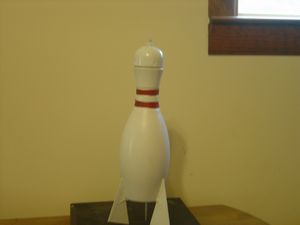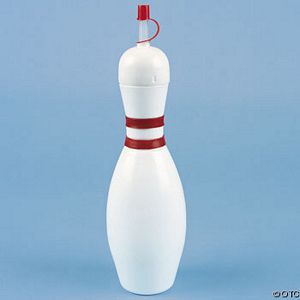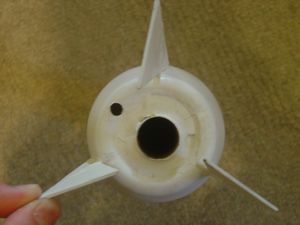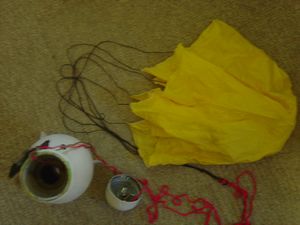Scratch Bowling Pin Original Design / Scratch Built
Scratch - Bowling Pin {Scratch}
Contributed by Taylor Jessee
| Manufacturer: | Scratch |

Brief:
I needed a new rocket to fly on AT 24mm reloads that wasn't a 29mm rocket. When I saw this in my grandpa's garage, I
knew this was it. After much searching, I found that it was sold as a "bowling pin sipper cup".
Construction:
The parts list:
- 1 Plastic 10" plastic bowling pin sipper cup
- 1 7" piece of BT-50 tubing.
- 3 G10 fins (upper canards from a PML Amraam 3)
- 1 Bamboo Skewer
- 3' piece of braided nylon
- 1 22" nylon parachute
- 1 2" length of 1/4-20 all-thread with 2 nuts
I also needed was something dense to use as nose weight. I used "epoxy paste"
 I started by cutting a hole in the bottom of the item large enough for a 24mm motor tube. I couldn't get
a centering ring to cut to the right shape to be glued into the curved surface, so I wrapped the top end of the motor
tube with masking tape until I got a perfect fit. The nylon shock cord was then glued to the outside of the motor tube,
and the whole unit was slid in and glued with epoxy.
I started by cutting a hole in the bottom of the item large enough for a 24mm motor tube. I couldn't get
a centering ring to cut to the right shape to be glued into the curved surface, so I wrapped the top end of the motor
tube with masking tape until I got a perfect fit. The nylon shock cord was then glued to the outside of the motor tube,
and the whole unit was slid in and glued with epoxy.
At this point I entered the design into RockSim to see what the smallest fin shape I could use was. It was not as small as I would have liked. So since the rocket was a bit under optimal weight for 24mm motors at this point, I decided to add about 2-3oz of nose weight. That brought the center of gravity to a reasonable point. I still needed to add a secure point to attach the shock cord and I could still use a little bit of extra weight to the nose. Since there was a hole in the nose where the straw was, I drilled through the nose weight and put a small length of 1/4" threaded rod in there and an attachment point for the shock cord.
I could not think of a decent way to attach the fins to the plastic curved surface. I almost gave up and used very long bamboo skewers for fins, but that led me to my next idea. I drilled adequately spaced holes in the pin for 3 fins. Then I cut 3 short pieces of a bamboo skewer and glued them to the motor tube. The fins were then notched to fit over the skewers and were glued to them for a rigid joint. When attaching the fins, I was thinking about the stability and how close it was to neutral stability wise. So just as a theory I decided I could make the fins smaller if I canted them slightly for some spin-stability.


Finishing:
The only finishing requires was painting the fins and glue joints white.
Flight and Recovery:
I ran some simulations in RockSim and it said a D12-3 would take it somewhere around 500'. Although RockSim isn't
always all that accurate for odd-rocs and high performance rockets, this seemed like a reasonable altitude for a rocket
this size and weight.
I finally got to fly this rocket. I loaded it with a D12-3 for the test flight. At this point I was starting to doubt that this thing would fly at all! The center of gravity was so close to the center of pressure.
After the countdown it took off very, very straight! Not even in the best scenario in my mind did it go that incredibility straight up! It arced over and almost in slow motion exactly at apogee the big parachute came out and brought it down for a gentle landing. I must have done something right!!
Summary:
I feel that this rocket was 100% percent successful. I don't know how it could have gotten much better. It will be my
go-to rocket for small fields and 24mm reloads. Probably the only dislike of the rocket is the amount of recovery room
it has, which is maybe only about 2", but I can fit it all in there.
Sponsored Ads
 |
 |











